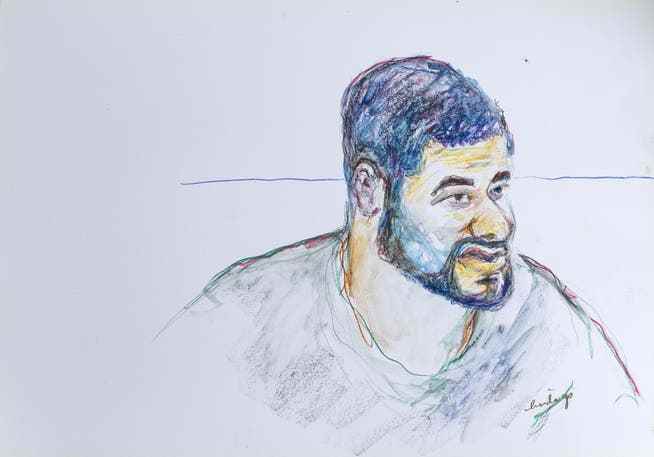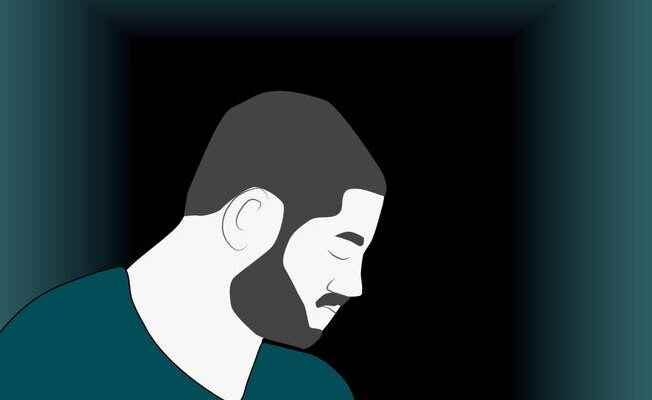The most important questions and answers on the case of Switzerland’s best-known prisoner.
It was a back and forth in the Brian case. Last Tuesday, the Zurich Supreme Court ruled that what is probably the best-known prisoner in Switzerland should be released until further notice. A continuation of the security detention is no longer proportionate. Rather, there is a risk of “excessive detention” – remaining in prison without a sentence, which lasts longer than the actual prison sentence.
On Thursday, however, things turned around: the public prosecutor’s office tried to prevent Brian’s release at the last moment and applied for remand for the 27-year-old as part of another criminal case.
Now the Zurich compulsory measures court has decided: It has approved the application of the public prosecutor. The young offender has to be remanded in custody. As the Zurich public prosecutor’s office writes on request, the compulsory measures court has affirmed the reason for the detention of the risk of recurrence.
What happens to Brian now? And how did these twists and turns come about in his case? The most important questions and answers.
Why is Brian still in prison now?
Brian’s reason for being in prison dates back five years. In the summer of 2017 he was in Pöschwies prison, where he was serving a prison sentence for attempted serious bodily harm. He spends most of that time in solitary confinement.
Then, after a period of regular detention, Brian is told he needs to go back to security. As a result, according to the prosecutor’s office, he is said to have physically attacked several supervisors. Brian himself speaks of a “scramble”.
Because of this act – committed shortly before the end of his sentence – and other crimes, Brian is finally charged. Because, according to the Zurich judicial authorities, he poses a security risk, he remains in prison straight away: first in custody, then in so-called security custody.
So Brian is not currently serving a sentence for which he has been convicted.
Nevertheless, he has been behind bars for more than five years. During this time, the District Court of Dielsdorf sentenced him to 4 years and 9 months. Last year, the Supreme Court increased the prison sentence to 6 years and 4 months and a fine for attempted serious bodily harm, simple bodily harm, damage to property, as well as insults and threats.
But then a federal court ruling changed everything. In its decision, the latter held that the lower court had to deal with the prison conditions to which the young man had already been exposed in his life. In addition, it criticized that the circumstances of Brian’s previous sentences and coercive measures had not been adequately processed. The Zurich chief justices have to go over the books again.
What does the prosecutor do?
The Zurich public prosecutor’s office applied to the compulsory measures court for pre-trial detention at the weekend. The motion follows a second trial against Brian. He is charged with a total of 33 offenses.
From the point of view of the public prosecutor’s office, Brian is at risk of recurrence. She therefore ordered Brian’s temporary arrest. However, the public prosecutor’s office did not appeal the decision of the High Court on the release from prison.
How will Brian’s release be prepared?
After the High Court’s decision, the Office for Prisons and Reintegration began to prepare for the 27-year-old’s release. In addition, the office did not want to comment with reference to the protection of privacy.
In general, spokeswoman Rebecca de Silva states that the office has no mandate and no legal basis for further care once someone is released from pre-trial or preventive detention. However, there is a social service in every prison that works together with the prisoner to prepare the release as well as possible. If there is no network of relatives or family, efforts are made to arrange accommodation and suitable contact points.
There are no accompanying measures. In Brian’s case, the Supreme Court decided not to order any alternative measures such as a reporting obligation, a ban on contact or a ban on rayons.
When is Brian’s next court hearing?
A date for the new appeal hearing before the Supreme Court has not yet been scheduled. Preliminary hearings took place in the summer, but according to the Supreme Court, both the public prosecutor and the defense made several applications for evidence, some of which were time-consuming.

Will have to appear in court more often: Brian at a hearing in the Zurich Higher Court in June 2021.
Among other things, the public prosecutor’s office requires extensive investigations into Brian’s previous detention and prison conditions. Based on this, the psychiatric report on the prisoner is to be supplemented or even completely rewritten. The Supreme Court also states that it is quite possible that further applications will be made, so that the appeal process could be drawn out even further.
What other court cases are going on?
The procedure, on which the Supreme Court has to decide again, is not the only pending one. Several other cases are currently dealing with the judiciary. They can be roughly divided into three categories:
- Brian against his overseers and doctors: Brian has already filed criminal complaints against prison employees on numerous occasions. With varying degrees of success: the public prosecutor responsible wants to stop two cases against employees of the Pöschwies correctional facility, but Brian’s lawyers have filed a complaint. In the autumn of this year, a guard at the Lenzburg prison was convicted by the Aargau High Court for allegedly kicking Brian when he was lying on the ground. The verdict is not yet legally binding. Trials are also pending against three psychiatrists who tied Brian to a bed for almost two weeks as a teenager. After acquittals in the district and high courts, it is currently pending in federal court.
- Brian against the authorities: The treatment of Brian in Pfäffikon prison during a stay in 2017 was inhumane, the Zurich district court ruled and awarded him 1,000 francs in damages. In this process, too, the last word has not yet been spoken. The same applies to two other cases regarding Brian’s detention conditions, which are currently pending before the European Court of Human Rights.
- The authorities against Brian: In addition to the proceedings, which are now pending reassessment at the Supreme Court, preliminary proceedings are still pending for various other incidents that are said to have occurred between November 2018 and June 2022 – all of them also within the prison walls. The process is still in its infancy, and the allegations made by the public prosecutor’s office include 33 offences. Among other things, it is about attempted serious bodily harm, simple bodily harm, property damage and violence and threats against authorities and officials. In connection with this procedure, the public prosecutor’s office had again applied for pre-trial detention.
The judiciary will have to deal with the Brian case for some time. The presumption of innocence applies in all proceedings.
How did Brian become the most famous prisoner in Switzerland?
It started with a TV documentary. It continued with a veritable media campaign. And it ended (for the time being) with a protest by a UN body.
Brian’s path to becoming a media figure is closely linked to the question: What should be more important in the Swiss penal system – punishment or reintegration?
In 2013, an SRF documentary was published about the youth lawyer Hansueli Gürber. Brian also appears in it, at the time under the pseudonym “Carlos”. He is 17, is considered a problem child, has stayed in homes and has been imprisoned for a knife attack. But also a stay in the psychiatric ward, during which he is tied to a bed for thirteen days. In the documentary, Gürber wants to show how he reintegrates this young man into society with a special setting – including Thai boxing lessons and his own apartment. But he achieves the opposite.
Blick is headlined “Social madness!”, other media jump up. The special setting and in particular its monthly costs of 29,000 francs are scandalized. The juvenile delinquent becomes a political issue, his special setting is abruptly ended and he is put back in prison. After his release, he committed two more crimes, now as an adult. In prison he ends up in solitary confinement. 23 hours a day in the cell, almost no outside contact, no leisure activities.
This turns Brian into a political issue again. The National Anti-Torture Commission and Nils Melzer, the then UN rapporteur on torture, are demanding a relaxation of detention in 2021. In January 2022, a UN working group described the Brian case as a “blatant example of systemic racism”. According to the allegation, Brian was treated more harshly than necessary because of the color of his skin. The authorities reject all of these allegations, but Brian’s prison regime has recently been relaxed. Also under pressure from the Federal Supreme Court, which had criticized the prison conditions in several decisions.
